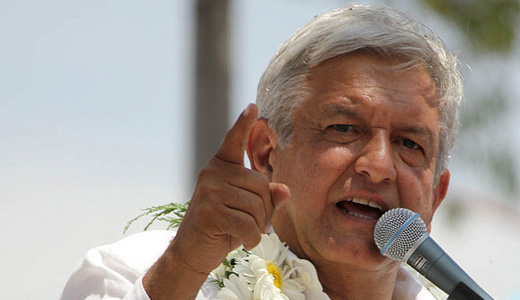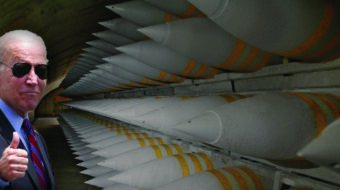
Mexico’s center-left presidential candidate, Andres Manuel Lopez Obrador, said he will not recognize a ruling by the top electoral court that the July 1 Mexican presidential elections were fair and clean.
The Judicial Electoral Tribunal on August 30 rejected a request by Lopez Obrador’s left-wing coalition, consisting of the Democratic Revolution Party (PRD), Labor Party (PT) and Citizens’ Movement, that the July 1 elections be annulled. The request was made after evidence emerged of massive fraud and illegal vote buying by right-wing presidential candidate Enrique Peña Nieto of the Institutional Revolutionary Party (PRI).
The court ruled that the left-wing coalition did not provide adequate proof to annul the elections and said there was no evidence that the PRI bought 5 million votes or used polls to manipulate elections results. The court also ruled that the PRI did not use pre-paid Soriana or Monex cards to buy votes.
The court ruled that the final adjusted total for all candidates was 50,143,616. Peña Nieto of the PRI got 19,158,592 votes and Lopez Obrador got 15,848,827, a percentage point spread of 6.62. This represents a slight reduction of the total vote of both of the leading candidates from the totals originally given out by the Federal Electoral Institute.
The two other presidential candidates fell far behind: Josefina Vazquez Mota of President Calderon’s National Action Party (PAN) got 12,732,660, and Gabriel Quadri of the New Alliance got only 1,236,000.
“I will not recognize an illegitimate power [Peña Nieto] that emerged from vote buying and other grave violations to the constitution and the laws,” Lopez Obrador told a press conference at his Mexico City headquarters on August 31. “To act in another manner would implicate betrayal of millions of Mexicans that fight against ‘simulation,’ farce and for real change.”
Alluding to the Federal Electoral Institute, which is in charge of organizing national elections and counting votes, and also to the Judicial Electoral Tribunal, Lopez Obrador said, “It is true that we should respect the institutions, but in good measure, the problem in Mexico is that institutions are kidnapped by white collar criminality. And a state that does not procure justice or democracy is no more than an instrument of power at the service of a group of vested interests. I hope they understand that as they defend, through all methods, the regime of corruption. !e are sincerely undertaking to abolish it.”
Following the elections, massive evidence emerged of vote buying and manipulation of ballots. Lopez Obrador charged that the PRI bought 5 million votes in impoverished areas. The most blatant evidence to corroborate his allegations were the emergence of pre-paid gifts cards that PRI campaign workers handed out to people in exchange for voting for the PRI. Sixteen PRI state governors played a role in distributing pre-paid gift cards for the Soriana department store, Monex bank gift cards, cash, farm supplies, tax write-offs and other items in exchange for casting a ballot for the PRI. Pasted on the walls of Lopez Obrador’s campaign headquarters are hundred of Soriana vouchers given to bribed voters.
Lopez Obrador and Ricardo Monreal Avila, the left coalition’s campaign coordinator, charged that the PRI governors funneled public, private and illicit money, including U.S. funds amounting to billions of pesos, to PRI operatives at the local level, and those operatives used the funds to buy the votes. Peña Nieto met with the 16 PRI governors on June 12 to plan the massive vote buying operation, claimed the two leaders. For political parties to buy votes is illegal in Mexico.
National Action Party (PAN) President Gustavo Madero admitted that the PRI always wins elections through “money and deception.” He questioned the legitimacy of Peña Nieto’s victory given the PRI’s illegal massive vote buying effort during the elections.
PAN worked with Lopez Obrador’s coalition to expose the PRI’s financing and massive vote buying during the elections, asking both the Federal Electoral Institute and Mexico’s attorney general to investigate.
Peña Nieto denies the allegations and accuses Lopez Obrador of being a sore loser.
Lopez Obrador said his movement will undertake peaceful civil disobedience to overturn the electoral court ruling and is asking his followers to gather in the Zocalo, the great plaza in downtown Mexico City, on Sept. 9.
This is the second time the electoral court has ruled against Lopez Obrador. Lopez Obrador, a former schoolteacher and popular governor of the Federal District (a large state that includes Mexico City), ran as the PRD-PT’s presidential candidate in 2006. Election officials announced that PAN candidate Felipe Calderon had narrowly won the elections. Evidence of widespread fraud and irregularities surfaced, however, as many of the final vote counts sent from polling stations did not match the numbers of people who reportedly voted.
On that occasion, the PRD and PT staged mass rallies and protests to demand a vote recount. The Judicial Tribunal agreed to recount only 9.7 percent of polling places and fraud was uncovered. The final recount narrowed Calderon’s lead over Lopez Obrador but the PAN presidential candidate was still declared the winner.
Meanwhile, #Iam132, the student protest movement that emerged to prevent Piena Nieto from winning the presidency, vowed to continue its campaign of peaceful disobedience to oppose the “imposition” of Peña Nieto.
Peña Nieto, 46, a former governor of Mexico State, will take power on December 1 and his term will last until 2018.
Photo: Stock image of Lopze Obrador. Arturo Alfaro Galán // CC 2.0

MOST POPULAR TODAY

Zionist organizations leading campaign to stop ceasefire resolutions in D.C. area

High Court essentially bans demonstrations, freedom of assembly in Deep South

UN warns that Israel is still blocking humanitarian aid to Gaza

U.S. imperialism’s ‘ironclad’ support for Israel increases fascist danger at home







Comments